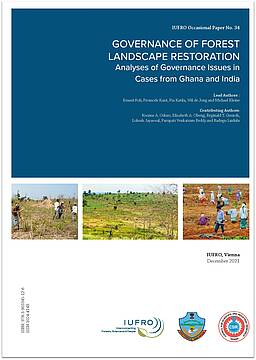Resource information
This report highlights important differences in political, legal, and institutional environments, and the need to recognise opportunities and limitations in the local context when restoring land.
Forest landscape restoration is widely recognised as a continuous process that requires considerable time to lead to visible results that impact people’s livelihoods and well-being. This report aims at increasing the understanding of governance in the context of restoration projects in two very different contexts, in India and Ghana, and thus shedding light on the role of governance and institutions in shaping restoration efforts and their outcomes and impacts.
Adequate data and research play an important role in shaping participatory social processes supporting forest landscape restoration; therefore, the present study has been implemented as a follow-up to an IUFRO-led comprehensive analysis in 2019 of the progress made in forest landscape restoration implementation in 17 different landscapes in nine selected countries in Africa, Asia and Latin America. Case studies in the Bono region of Ghana and in Gajwel and Mulugu Mandalas of Telangana, India that were part of the 2019 work have been further analysed with specific focus on forest landscape restoration-related governance issues.
The study, coordinated by IUFRO’s Special Programme for Development of Capacities (IUFRO-SPDC), was implemented by scientists of Ghana and India in close collaboration with the IUFRO Special Project World Forests, Society and Environment (IUFRO-WFSE). The cooperation combined local expertise and research data from Ghana and India with governance experiences related to forest landscape restoration from other organizations, countries and regions. The German Federal Ministry for the Environment, Nature Conservation and Nuclear Safety (BMU) funded the study.
Key messages distilled from the results may be helpful for guiding forest landscape restoration work in similar circumstances elsewhere.

